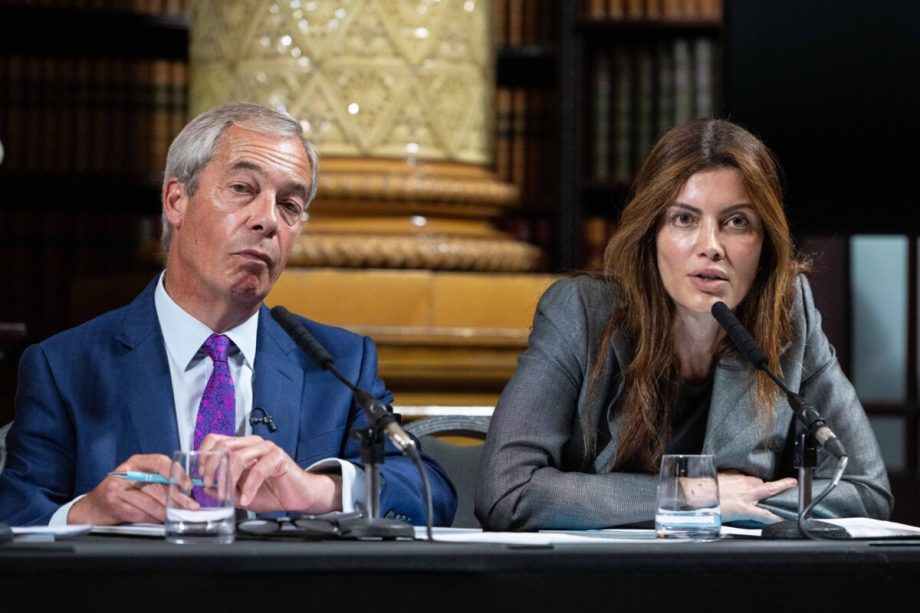“Britain isn’t a dumping ground for dangerous men from failed states.” With this stark statement, Laila Cunningham casts a dark shadow over the very country she was born in — a country that welcomed her Egyptian parents back in the 1960s. It’s a deeply troubling lapse in both language and morality. What kind of arrogance allows someone to direct such venom towards the very communities they come from? By her own logic, wouldn’t she and her family be part of this so-called “dumping ground”? This is not simply a slip of the tongue — it’s a rhetorical assault that strips away the most basic sense of humanity. It betrays a bitter disdain for those who, like her parents, sought refuge in Britain in search of safety, dignity, and a better life.
Cunningham, recently unveiled as the Reform Party’s latest figurehead alongside Nigel Farage, represents a familiar political tactic in Britain: elevating minority voices to front racist agendas under the guise of diversity. A British lawyer of Egyptian heritage, she recycles classic far-right narratives targeting immigrants, Muslims, and ethnic minorities — but delivers them with an “insider’s voice”. Her identity is weaponised to give cover to rhetoric that white politicians would otherwise hesitate to say aloud for fear of being accused of racism.
Rather than stand in solidarity with the communities she reflects, Cunningham has chosen to turn against them. In one of her most jarring interventions, she dismissed Islamic Sharia law as “not equality but surrender,” and told those who support it to “live elsewhere.” She accuses the Labour Party of “pandering to minorities” and “trading British values for votes,” and paints Muslim civic expression as an existential threat to Britain — a position that undermines the very pluralism and democratic freedoms this country professes to uphold.
Perhaps most revealing is her attempt to mask this rhetoric as reasoned concern. Cunningham insists she’s not opposed to Islam, only to what she calls the “Islamisation” of British society. But her words rarely target extremism; instead, they question the very presence of Muslims in the public sphere — portraying them as a burden to be assimilated or pushed out entirely, in the name of a so-called “pure British model.” In reality, this model is nothing more than an echo of white nationalism cloaked in the language of order and identity.
But the issue is bigger than Cunningham alone. She is a symptom of a wider political trend that exploits minorities for political gain. Figures like Suella Braverman and Priti Patel have walked the same path: elevated within right-wing parties as tokens of inclusivity, only to be used to justify exclusionary policies — and discarded once their symbolic value wears off. These are not genuine partners in shaping inclusive politics. They are stage props in a grim political theatre, ultimately replaceable when the performance ends.
Recognition without justice is not liberation: Gaza demands more
There is a painful hypocrisy at the heart of Western discourse. While Western leaders speak loudly about protecting “minority rights” abroad — particularly in Arab nations — they often seek to suppress those same rights at home. The call for integration frequently becomes a demand for total assimilation, where cultural and religious differences are erased rather than respected.
Against this troubling backdrop stands a powerful contrast: Haya Adam, an Egyptian student recently expelled from her university for expressing solidarity with Palestine. Unlike Cunningham, Haya refused to compromise her values. She paid the price for her convictions and stood firm in her pursuit of justice. Her story is one of integrity, sacrifice, and moral courage — a reminder of what it means to stand with the oppressed rather than profit from their marginalisation.
Cunningham’s brief media spotlight and her prospective bid for London Mayor in 2028 under a far-right banner do not represent progress. True progress cannot be born from disowning one’s roots or weaponising one’s identity against their own community. Respect is not won by embracing bigotry — it is earned by standing on principle.
When Cunningham declares that “Britain isn’t a dumping ground for dangerous men from failed states,” she not only slanders countless innocent people — she degrades herself first. This isn’t political commentary; it’s a personal wound dressed up in populist slogans.
Britain now stands at a crossroads. Will it continue down the path of exclusionary nationalism, or will it reclaim the ideals of diversity, dignity, and inclusion? The answer lies not in manufactured soundbites, but in the courage to defend the rights of all who call this country home.
The views expressed in this article belong to the author and do not necessarily reflect the editorial policy of Middle East Monitor.
